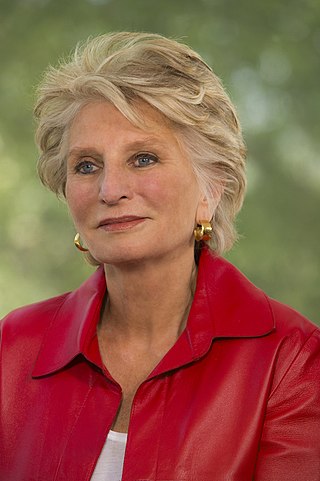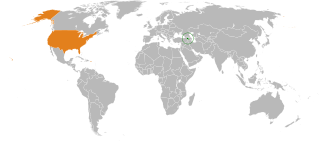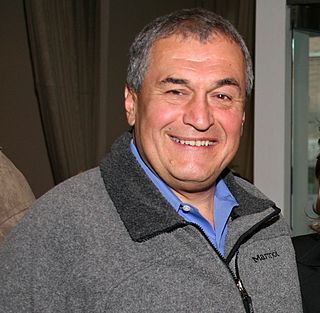This article needs to be updated.(May 2016) |
The Turkish lobby in the United States is a lobby that works on behalf of the Turkish government in promoting that nation's interests with the United States government.
This article needs to be updated.(May 2016) |
The Turkish lobby in the United States is a lobby that works on behalf of the Turkish government in promoting that nation's interests with the United States government.
In 2009 the Turkish lobby spent almost $1.7 million lobbying American officials on issues important to the Turkish government. [1] Lobbyists working on behalf of and paid by the government of Turkey include former Congressman Dick Gephardt and former Congressman Bob Livingston. [1]
According to ProPublica, in 2007-8 paid, professional lobbyists acting on behalf of the government of Turkey had more contacts with members of congress than lobbyists acting for any other foreign government. [2]
The Turkish lobby worked "intensely" to prevent the passage of HR 106, the United States resolution on Armenian genocide. [3] [4] The New York Times writes that, "former Representative Robert Livingston (Bob Livingston) has been the main lobbyist for Turkey in blocking congressional efforts to pass an Armenian genocide resolution." [4] In 2010 The Washington Post wrote that the Armenian genocide resolution "prompted an aggressive push by the government of Turkey and its lobbying firm led by former House majority leader Richard A. Gephardt (D-Mo.), who had urged recognition of the Armenian genocide when he was in Congress. Public-relations firm Fleishman-Hillard also has a contract with Turkey worth more than $100,000 a month, records show. [5] A "contingent of members of the Turkish parliament visited Washington" to lobby on behalf of the Turkish view. [5]
According to The Washington Post , "The Turkish government has spent millions on Washington lobbying over the past decade, much of it focused on the Armenian genocide issue. The country's current lobbyist, the Gephardt Group, collects about $70,000 a month for lobbying services from the government in Ankara, according to federal disclosure records. Another group, the Turkish Coalition of America, has targeted the districts of committee members who are considered potential swing votes, including submitting op-eds to local newspapers from the group's president." [5]
The Turkish lobby's efforts were finally overcome by motions by both the Senate and the House of Representatives of the United States in 2019 to affirm the Armenian genocide as a matter of US policy. [6]
According to ProPublica, Turkey is one of "The Top Players in Foreign Agent Lobbying," spending $3,524,632 lobbying the American government in 2007 and 2008 alone. [7]
According to the Sunlight Foundation, the government of Turkey "has consistently lavished millions each year on well-connected Washington lobbying firms." [8]
In politics, lobbying, or advocacy, is the act of lawfully attempting to influence the actions, policies, or decisions of government officials, most often legislators or members of regulatory agencies, but also judges of the judiciary. Lobbying, which usually involves direct, face-to-face contact in cooperation with support staff that may not meet directly face-to-face, is done by many types of people, associations and organized groups, including individuals on a personal level in their capacity as voters, constituents, or private citizens; it is also practiced by corporations in the private sector serving their own business interests; by non-profits and non-governmental organizations in the voluntary sector through advocacy groups to fulfil their mission such as requesting humanitarian aid or grantmaking; and by fellow legislators or government officials influencing each other through legislative affairs in the public sector. Lobbying or certain practices that share commonalities with lobbying are sometimes referred to as government relations, or government affairs and sometimes legislative relations, or legislative affairs. It is also an industry known by many of the aforementioned names, and has a near complete overlap with the public affairs industry. Lobbyists may be among a legislator's constituencies, for example amateur lobbyists such as a voter or a bloc of voters within their electoral district acting as private citizens; others like professional lobbyists may engage in lobbying as a business or profession; while others are government relations support staff who work on behalf of professional lobbyists but do not actively participate in influencing or meeting face-to-face with targeted personnel enough to be considered registered lobbyists while working in the same professional circles as professional lobbyists who are legally designated as registered lobbyists.

Richard Andrew Gephardt is an American attorney, lobbyist, and politician who represented Missouri's 3rd congressional district in the United States House of Representatives from 1977 to 2005. A member of the Democratic Party, he was House majority leader from 1989 to 1995 and minority leader from 1995 to 2003. He ran unsuccessfully for the Democratic nomination for President of the United States in 1988 and 2004. Gephardt was mentioned as a possible vice presidential nominee in 1988, 1992, 2000, 2004, and 2008.
The American Israel Public Affairs Committee is a lobbying group that advocates pro-Israel policies to the legislative and executive branches of the United States. One of several pro-Israel lobbying organizations in the United States, AIPAC states that it has over 100,000 members, 17 regional offices, and "a vast pool of donors". In addition, the organization has been called one of the most powerful lobbying groups in the United States.

Jane Margaret Harman is the former U.S. Representative for California's 36th congressional district, serving from 1993 to 1999, and from 2001 to 2011; she is a member of the Democratic Party. Harman was the ranking Democrat on the House Intelligence Committee (2002–2006), and chaired the Homeland Security Committee's Intelligence Subcommittee (2007–2011). Resigning from Congress in February 2011, Harman became President and CEO of the Woodrow Wilson International Center for Scholars. She succeeded former Congressman Lee Hamilton and was the first ever woman to lead the organization. She stepped down in February 2021 after a decade, and is a Distinguished Scholar and President Emerita.

Robert Linlithgow Livingston Jr. is an American lobbyist and politician who served as a U.S. Representative from Louisiana from 1977 to 1999. A Republican, he was chosen as Newt Gingrich's successor as Speaker of the U.S. House of Representatives, a position he declined following revelations of an extramarital affair. He served as a U.S. Representative from Louisiana from 1977 to 1999 and as the Chairman of the Appropriations Committee from 1995 to 1999. During his final years in Congress, Livingston was a strong supporter of Bill Clinton's impeachment. He is currently a Washington, D.C.-based lobbyist. Livingston's memoir, The Windmill Chaser: Triumphs and Less in American Politics, was published in September 2018.

John Vincent Weber is an American politician, lobbyist and former Republican Congressman from Minnesota.

The Foreign Agents Registration Act (FARA) is a United States law that imposes public disclosure obligations on persons representing foreign interests. It requires "foreign agents"—defined as individuals or entities engaged in domestic lobbying or advocacy for foreign governments, organizations, or persons —to register with the Department of Justice (DOJ) and disclose their relationship, activities, and related financial compensation.

Lobbying in the United States describes paid activity in which special interest groups hire well-connected professional advocates, often lawyers, to argue for specific legislation in decision-making bodies such as the United States Congress. It is often perceived negatively by journalists and the American public; critics consider it to be a form of bribery, influence peddling, and/or extortion. Lobbying is subject to complex rules which, if not followed, can lead to penalties including jail. Lobbying has been interpreted by court rulings as free speech protected by the First Amendment to the U.S. Constitution. Since the 1970s, the numbers of lobbyists and the size of lobbying budgets has grown and become the focus of criticism of American governance.
The Arab lobby in the United States is a collection of formal and informal groups and professional lobbyists in the United States paid directly by Gulf Arab states and private donors on behalf of the Arab states.

Anthony John (Toby) Moffett, Jr. is an American former politician from the state of Connecticut. A Democrat, he served in the United States House of Representatives as the member from Connecticut's 6th congressional district from 1975 to 1983. Moffett is currently Senior Advisor at Mayer Brown LLP.
Steven A. Elmendorf is a lobbyist in Washington, D.C., who was a senior advisor to House Democratic Leader Dick Gephardt for 12 years, serving as his chief of staff after 1997. Elmendorf was also deputy campaign manager for U.S. Senator John Kerry, the 2004 Democratic nominee for president.

Armenian genocide recognition is the formal acceptance that the systematic massacres and forced deportation of Armenians committed by the Ottoman Empire from 1915 to 1923, during and after the First World War, constituted genocide.

The United States' recognition of the Armenian genocide is the American formal recognition that the deportation and massacre of Armenians by the Ottoman Empire during the First World War constituted genocide. The United States recognizes the Armenian genocide through two congressional resolutions passed by both houses of the United States Congress, and by presidential announcement. The House of Representatives passed a resolution with broad support on October 29, 2019, and the Senate did the same by unanimous consent on December 12, 2019, making the recognition of the Armenian genocide part of the policy of the United States. Before 2019, there were numerous proposed resolutions in Congress to recognize the Armenian genocide, all failing to receive enough support.

The Podesta Group was a lobbying and public affairs firm based in Washington, D.C. It was founded in 1988 by brothers John and Tony Podesta and has previously been known as Podesta Associates, podesta.com and PodestaMattoon. John Podesta left the firm in 1993, and Tony Podesta left the firm on October 30, 2017, after finding out about increased scrutiny of the firm. It has essentially ceased to exist since then. The firm reorganized in January 2007 after chairman Tony Podesta split with former business partner Dan Mattoon.

The dissolution of the Soviet Union in December 1991 brought an end to the Cold War and created an opportunity for establishing bilateral relations between the United States with Armenia and other post-Soviet states as they began a political and economic transformation. The United States recognized the independence of Armenia on 25 December 1991, and opened an embassy in Armenia's capital Yerevan in February 1992.
The Armenian American lobby is the diverse coalition of those who, as individuals and as groups, seek to influence the United States foreign policy in support of Armenia, Armenians or Armenian policies. One of its primary goals is for the United States to recognize the Armenian genocide, but the Turkish lobby have, until recently, successfully lobbied against this.
The Egypt lobby in the United States is a collection of lawyers, public relation firms and professional lobbyists paid directly by the government of Egypt to lobby the public and government of the United States on behalf of the interests of the government of Egypt.
The Libya lobby in the United States is a collection of lawyers, public relation firms and professional lobbyists paid directly by the government of Libya to lobby the public and government of the United States on behalf of the interests of the government of Libya.

Anthony Thomas Podesta is an American lobbyist best known for founding the Podesta Group. The brother of former White House Chief of staff John Podesta, he was formerly one of Washington's most powerful lobbyists and fundraisers.
During its existence, the Republic of Artsakh and the United States did not have official diplomatic relations as the United States was among the vast majority of countries that did not recognize Artsakh as a sovereign nation and instead recognized the region of Artsakh, or Nagorno-Karabakh, as part of Azerbaijan. Despite no formal relations, the Republic of Artsakh had a representative office in Washington, D.C. since November 1997. It is not known whether the office still functions after the apparent dissolution of Artsakh.